Bathed in purple neon light and wearing a daringly cut dress dripping with metallic sequins, a woman writhes on a nightclub dance floor to Bryan Ferry’s 1974 glam-rock cover of ‘The “In” Crowd’. The scene could be from a documentary on Studio 54 on its disco heyday, but this is London between the wars: the era of Evelyn Waugh, the Bright Young Things and bohemian excess. Emily Mortimer’s adaptation of Nancy Mitford’s The Pursuit of Love is filled with such moments, in which the past converges with more recent eras. With its distinctive visual style and contemporary soundtrack, the series joins a string of period pieces following from Sofia Coppola’s Marie Antoinette (2006) that embrace, and even naturalise, anachronism.
This production’s commitment to interpreting the past through the lens of the present may strike viewers – who have already seen the Georgian heroines of Shonda Rhimes’s Bridgerton gavotte to Taylor Swift’s ‘Wildest Dreams’ and witnessed children dancing to David Bowie’s ‘Heroes’ in Taika Waititi’s Second World War tragicomedy Jojo Rabbit – as far less audacious than it seemed 15 years ago, when Coppola’s film was released to jeers at the Cannes Film Festival. Despite the familiarity of the period-piece-goes-punk-rock genre, The Pursuit of Love excels because its anachronistic irreverence is matched perfectly to the effervescence of its source material, Nancy Mitford’s novel of 1945, which both celebrates and skewers the excesses of the author’s generation – and particularly, her own famous family.
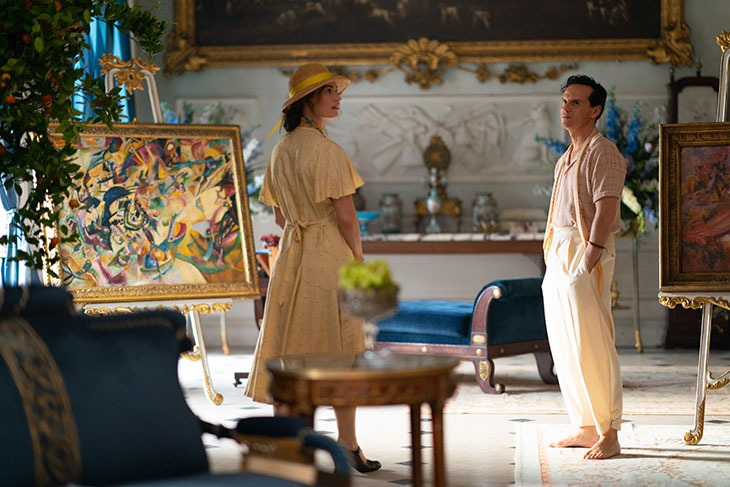
Photo: Theodora Films Limited & Moonage Pictures Limited/Robert Viglasky
Mortimer, who writes, directs and acts in this adaptation for the BBC, is miraculously faithful to Mitford’s dry, dazzling book, keeping the clipped sentences of its narrator and the snappy dialogue largely intact. As an actor, she takes on a plummy cameo as The Bolter, mother of the stick-in-the-mud narrator Fanny, who is renowned for leaving a trail of men in her wake. The series is laden with fine actors who seem to be having a blast romping about in 1930s costumes, particularly Lily James, who plays the freewheeling Linda (wearer of the slinky disco dress), and Emily Beecham in the more difficult and less showy role of Fanny. Andrew Scott appears as Lord Merlin, a bohemian aristocrat who takes Linda under his bedazzled wing. Part Bowie, part Cecil Beaton, Merlin sweeps Linda into his decadent world, giving her a Renoir that her in-laws hate and setting her up in a little doll’s house in Chelsea to help her escape them.
In scenes like Lord Merlin’s introduction to the staid Radlett family, Mortimer conveys a sense of breathtaking harmony in visuals, music and performance. To the strains of T. Rex’s ‘Dandy in the Underworld’ (1977) and wearing silk polka-dotted pyjamas, Scott struts and preens, exuding sexual charisma, until you wonder how any other actor and any other song could have more perfectly set the scene. Like Linda, the viewer falls in love at first sight, deciding, as the book says, ‘she would become one of these brilliant things’. Through this sensory feast, the series – and this is part of what makes it a great adaptation – articulates to the viewer’s eye and ear precisely why Linda is obsessed with this crowd.
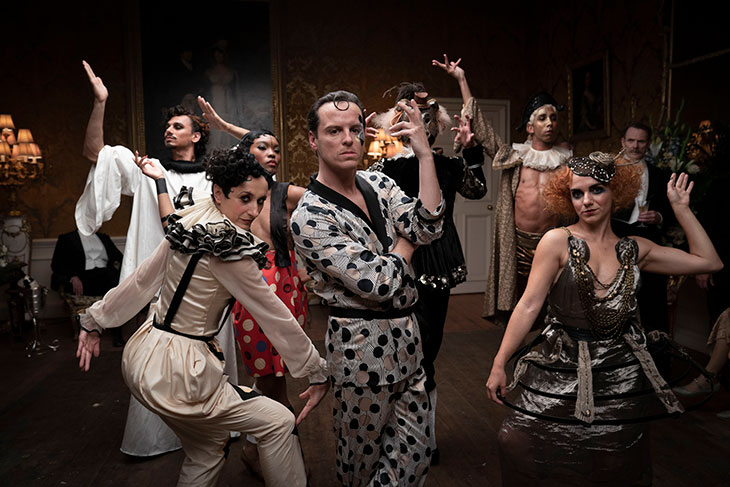
Andrew Scott as Lord Merlin (centre). Photo: Theodora Films Limited & Moonage Pictures Limited/Robert Viglasky
The visual style and tone of The Pursuit of Love are clearly indebted to Wes Anderson, whose penchant for symmetrical shots, cue cards in stylised fonts and mannered conversations Mortimer appears to share. Anderson makes sense as a touchstone given his own fascination with highly literate, deeply dysfunctional families. With the private languages between siblings and the eccentric patriarch cracking whips on the lawn at dawn, the idiosyncratic Radletts bear a resemblance to the Royal Tenenbaums clan – although it is perhaps rather that the Tenenbaums are indebted to the real-life Mitford family, whose various members embraced fascism and communism with equal vigour, who loved and fought and married and divorced, all in the public eye.
There are moments when Mortimer’s adaptation nearly capsizes under the narrative problem at the heart of Mitford’s book: the central character, Linda, is selfish and immature, abandoning her daughter and shopping her way through Paris as war looms. Like Marie Antoinette, she’s not an easy heroine to like. The series attempts to counter this with Lily James’s performance as Linda, relying on the actor’s charm and expressive eyes to help us excuse what Mitford called the character’s ‘frippery and silliness’. The adaptation also challenges its viewers to reflect on why they may initially dislike Linda, suggesting that her attempt to live life exactly on her own terms is a brave and rare thing. It makes a big deal of the contrast between Linda and the careful and conservative Fanny, emphasising Fanny’s devotion to Linda despite all their differences. And it’s Linda and Fanny’s relationship which comprises the emotional heart of the series; theirs is the ultimate love story here. It is when the camera lingers on the girls sharing their dreams in a linen cupboard or laughing in the bath that Mitford’s world is most fully humanised, and perhaps most similar to our own.
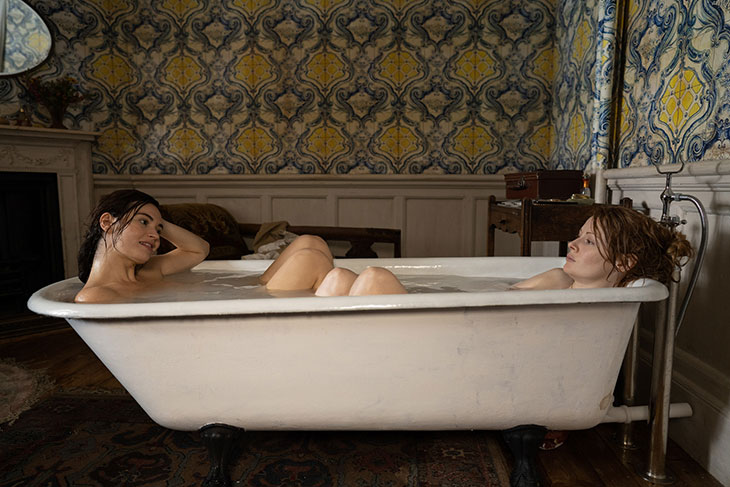
Lily James as Linda (left) and Emily Beecham as Fanny (right). Photo: Theodora Films Limited & Moonage Pictures Limited/Robert Viglasky
Yet The Pursuit of Love never completely commits to presentism: every time a musical cue threatens to collapse past into present, the ordered visual world of the series insists on its otherness from the everyday. This is a version of the past defined by its sense of symmetry and beauty; even when she is sitting on top of a pile of rubbish after her house is destroyed during an air raid, Linda’s red lipstick and coiffed hair remain unblemished. But the series ends on a note that suggests the underlying pain and trauma of womanhood; even beautiful and iconoclastic women like Linda are still punished for their daring. If at times both the series and Linda seem too wrapped up in their own beauty, the tragic fate of that character allows Mortimer’s adaptation to evince precisely the point of Mitford’s book: that society has no role for beautiful women past their prime.
The Pursuit of Love (dir. Emily Mortimer) is broadcast on BBC One.
Unlimited access from just $16 every 3 months
Subscribe to get unlimited and exclusive access to the top art stories, interviews and exhibition reviews.


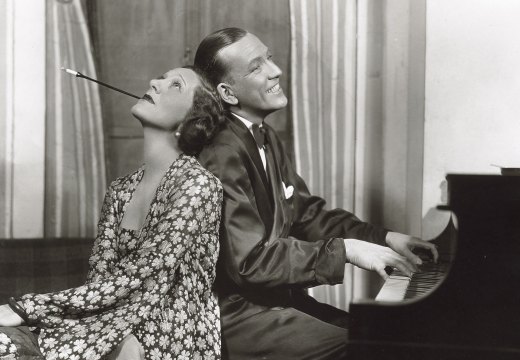

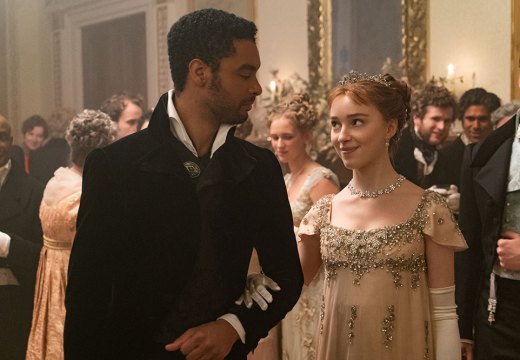





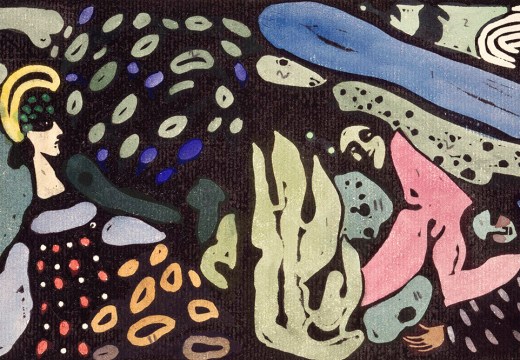
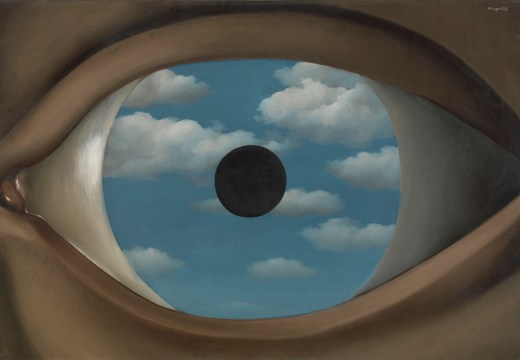

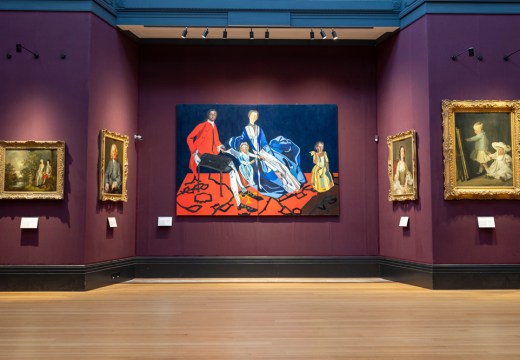
![Masterpiece [Re]discovery 2022. Photo: Ben Fisher Photography, courtesy of Masterpiece London](http://www.apollo-magazine.com/wp-content/uploads/2022/07/MPL2022_4263.jpg)
Has the Fitzwilliam lost the hang of things?